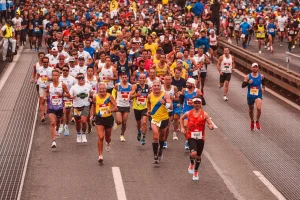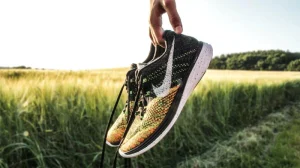Date fruit is sweet and tasty, full of nutrients, they have easily digestible flesh, and revitalizes the body instantly after a hard workout.
There are many different types of dates.
Mainly, on the market, there are Medjool dates and regular dates.
Medjool dates contain more moisture to stay stored for up to eight months.
On the other hand, dried dates don’t contain much moisture and can stay stored for one year.
Dates are a fruit that is typical for the middle eastern region.
Yes, dates are excellent for runners. They are tasty and revitalize your energy very quickly. They are full of nutrients like vitamins, minerals, and micro-minerals.
They provide a lot of energy and are the best choice to fuel your body before and while running.

Is There a Difference Between Regular Dates and Medjool Dates?
The main difference between Medjool dates and regular dates is their freshness and texture.
Medjool dates and regular dates come from different cultivars of the same plant. Picking Medjool dates is earlier in the ripening season when they are soft. Regular dates, also known as “Deglet Noor dates,” fall in the semi-dry dates category.
Medjool dates have a delicate caramelly taste, are easier to eat, and are pretty soft, while regular dates are drier, firmer, and almost nutty. When it comes to nutritional value, regular dates are identical to Medjool dates; however, they have more fiber, fat, and protein.
How Much Energy Do Dates Provide?
‘”It is a high energy source, as 100 g of flesh can provide an average of 314 kcal: ten minerals, the significant being selenium, copper, potassium, and magnesium. So eating 100 g of dates can provide approximately 15% of the recommended daily allowance from these minerals.”
That is why we can call them a superfood.
How Many Dates Should You Take Before a Workout?
Dates are naturally high in sugar, and they don’t release sugar in the blood quickly. Instead, they provide a type of slow-releasing carb that allows for a steady stream of energy to fuel the workout. That’s why dates are suitable for long-distance runners, especially those that run 5 K and above 5K distance. Try having 2–4 dates 30–60 minutes before a workout.
Should You Eat Dates After a Workout?
Dates are also suitable for post-workout. The carbs in date fruit can help you refuel your energy levels. Because they have high potassium content also allows you to restore lost electrolytes. Finally, its antioxidant capacity helps reduce inflammation, which means optimal recovery.
Healthy Recipes with Dates Suitable for Runners
1. Stuffed dates.
I found on the internet an exciting recipe for stuffed dates.
It contains only three ingredients: dates, peanut butter (or any nut butter), and salt.
First, you have to pull out the pit, stuff it with your favorite nut butter, and sprinkle it with a bit of salt. Voila!
2. Dates and banana smoothie
Another quick and easy recipe with dates: Add a few chopped dates into a banana smoothie, and you are ready for the next run.
3. Recipe for energy balls with dates
There are many different combinations of recipes on the internet explaining how to make energy balls with dates. When it comes to mixing, you can be creative. Blend the dates and mix them with oats, nuts, coconut flakes, or other ingredients.
4. Medjool Dates Energy Gel with Chia and Strawberries
Take six pitted dates and four strawberries. Mix them in a blender and add one tablespoon of Chia seeds, a pinch of salt, one tablespoon of Lime, and two tablespoons of water.
Blend it all until smooth. You can split it into three parts and keep it in the refrigerator until use.
5.
What are the Vitamins and Minerals in Dates?
The USDA provides the following nutrition information:
| fat | 0g |
|---|---|
| calories | 23 |
| sodium | 0.2mg |
| fiber | 0.6g |
| carbohydrates | 6g |
| protein | 0.2g |
| sugars | 5g |
| magnesium | 3.4mg |
| potassium | 53mg |
| iron | 0.1mg |
Dates contain many Vitamins, which are crucial for runners, like Vitamine B6 and Vitamine C.
I will give you a few facts about dates’ nutrition values:
Let’s start with vitamins and minerals in dates.
Dates contain Vitamine A1, Vitamine B1, Vitamine B3, Vitamine B5, Vitamine C, and Vitamine K.
Vitamine B6 has a significant role in producing energy.
They are rich sources of iron and potassium.
Iron has an impact on the oxygen-carrying capacity of the blood.
Potassium is an essential component of cells.
Also, potassium in body fluids has a crucial role in helping regulate heart rate and blood pressure.
Date fruit contains magnesium, copper, selenium, and calcium micro-minerals.
Magnesium is essential for bone growth.
Calcium is essential for muscle contraction, blood clotting, and nerve impulse conduction.
There is a presence of flavonoid antioxidants known as tannins in dates to help prevent infection and inflammation. Also, date fruit has anti-hemorrhagic (prevent easy bleeding tendencies) properties.
That is very important for runners because injuries are prevalent in the long run.
It also contains carbohydrates essential for sustained energy during extended workouts and long running.
And they have almost zero cholesterol, which is fantastic for losing weight.
Are Dates Good to eat During a Marathon?
During any long-distance run, you should be taking in about 100 calories after about an hour of running and then another 100 calories every 40 to 45 minutes. So if one Medjool date has about 66 calories, you will need approximately 2-3 dates for about 2 hours of running.





